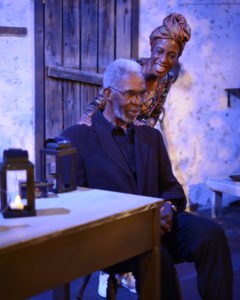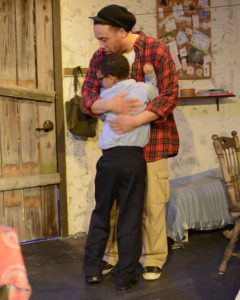With Eleanore Tapscott’s gentle, affecting, eloquent direction, the Port City Playhouse production of Athol Fugard’s Coming Home (2009) is an exemplary work about love, loss and resilience. The bittersweet world of Fugard’s script is made visible and palatable with acting deep from the cast’s heart with praiseworthy detailed design elements. With an intimate seating arrangements, the Port City Playhouse audience is brought snugly into a world most might likely far from their everyday life, in a play likely rarely seen on local stages. And all accomplished with a limited budget.
The play is about the coming home of an HIV-positive woman who returns with her son to the rural South African village where she grew up. She hopes to make a new life for herself and especially her son. It will take a ghost as well as persuading her childhood to be a part of her plan for the woman to be able to truly “come home.” The arc of Coming Home provides life lessons about good, some harsh realities of life, and learning to survive so the next generation can do more than merely endure.

Please don’t be put off by the subject matter, for the show has a hopeful essence with scenes of great tenderness. As across time and reality, the seeds for a hopeful future are collected to be later planted. And the seeds are both of plants to sustain human life, but seeds as well, that are in the form of words and literacy.
As Veronica, the woman returning to her small village after an unsuccessful try making a life as a singer in the big city of Cape Town, Ivana Alexander gives a deeply poignant performance. She can be full of abundant life and then slowly slide into melancholy before the audience. When Alexander breaks into acapella songs and smooth movements to cheer-up others, her voice simply clears away doom in the air
In Act I, Alexander appears chipper, and with purpose, attentive to her young son. She is wearing a smile as bright as her dress as she tries to remove the doubts that her son expresses about their new home. But, does her upbeat demeanor hide a secret for her return a small village to a dim, unoccupied house?
In Act II, Alexander has turned noticeably inward, her posture more a slump, walking slowly, her voice an octave lower. Her character Veronica is inching slowly to the consequences of life with HIV without the ability to afford drugs to combat the onset of AIDS. But, she displays a focused motherly fierceness. She is determined to provide a future for her son Mannetije (played with aplomb and confidence by home-schooled 3rd grader Justice Ervin).
The Coming Home audience will become taken by the dependable character of Alfred (an immensely likeable Mack Leamon, who provides a nuanced who provides a nuanced portrait of a decent man in a bewildering world trying and succeeding in doing the right thing). Alfred is Veronica’s childhood friend who trying to make life bearable for Veronica and Mannetije.
The fourth character in Coming Home is Oupa Jonkers (Art Green in a dignified performance), as Veronica’s deceased beloved Grandfather. Oupa returns in both acts, providing critical survival lessons for the living.
The Port City Playhouse production team has created a closed-in world that gives off the distress of the characters’ lives as well as the humor that often shines through the darkness especially in the relationship that grows between Alfred and Mannetijie over time.
The Coming Home set is a visual display of candor of living in a harsh environment starting with the interior of a rough-looking small house made of wattle and plaster from the mind of Set Designer Michael deBlois. The audience is treated to the craft work from Set Dresser Sherry Clarke which provides a vastly different essence of the home over the course of the play, with set painting by Becky Patton and set construction by David Correia.

Coming Home sound design from Brandon Holt includes pre-show and intermission music singers such as Miriam Makeba. Holt’s sound design also included some critical “radio” voices of South African government officials providing the “official” government take on HIV and AIDS. Listen closely. The effectively rendered costume design was by the Director Eleanore Tapscott. Let me also provide praise to dialect coaches Charles and Adri Lourens.
I don’t have the words,” are a key phrase in Fugard’s Coming Home dialogue. Don’t been misled. Fugard’s Coming Home has plenty of quietly spoken heard words as well as many unspoken ones delivered by actors who care about their characters and the story they depict. The four member cast works diligently to bring the humanity of Coming Home front and center. The overall affect is not of any angry political play but of one family’s efforts to make a better life and provide a safe-haven for her son.
Coming Home is sad, sweet and moving. It makes points through whispers rather than shouts. And we learn that words are power seeds to be planted for the future to take hold. Come open to Coming Home and you will be rewarded. Discard preconceived notions at the theater doorway and the production will wash over you.
Port City Playhouse has met its mission with Coming Home, “to produce top-quality thought-provoking plays within a diverse community that are either outside of the usual community theatre repertoire or are of significant historical or human importance.”
Running Time: One hour and 45 minutes, with one intermission.
Coming Home plays through May 14, 2016, at Port City Playhouse, performing at The Lab at Convergence – 819 North Quaker Lane, in Alexandria, VA. For tickets purchase them online.
RATING:






Heart is key to Fugard. Mr. Siegel is correct. See this one- 2 more chances on Saturday, May 14, 2016.